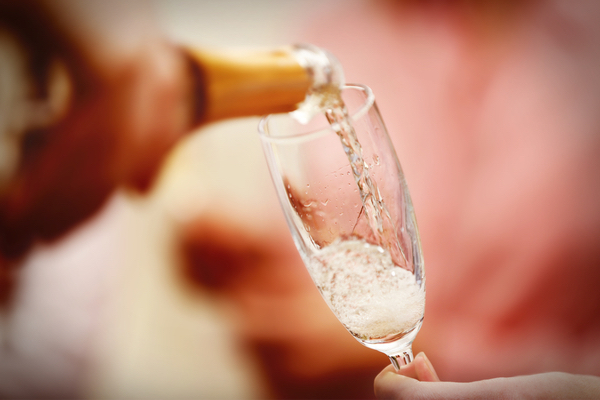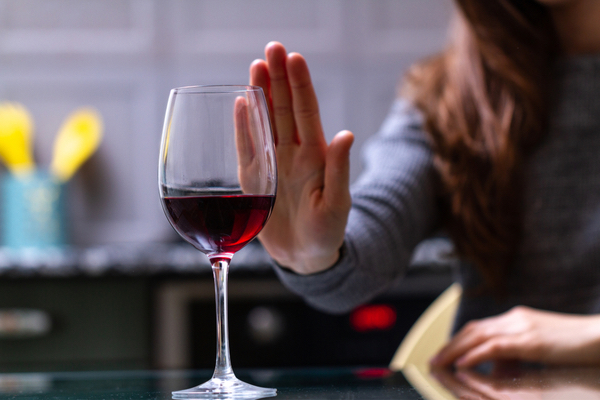The first Dry January campaign was in 2013. Five years later, 3.1 million Brits signed up to enjoy a hangover-free month. Now, in 2020, an increasing number of us are ditching booze altogether, including writer Kim Willis, 37, from Wiltshire, who herself went sober and hasn’t looked back…
Shortly after 6am every morning during the winter months, a flock of geese fly in formation over my garden. I’ve lived in rural Wiltshire for seven years, but this beautiful sky-serenade is new to me. If geese were flying over the garden for the previous six winters I didn’t know about it, because at 6am I used to be asleep.
Now, I’m wide awake and on my way for a run up, round and down the nearby hill. When I see the geese in what appears to be a private fly-by especially for me, my heart does a little leap. Those geese, for me, are a symbol of my sobriety.
Fuzzy Mondays
When I grew bored of the habitual cycle of tipsy weekends and fuzzy Mondays and decided alcohol no longer appealed, I started to live a more wholesome, rewarding, gentle life. I’d been flirting with sobriety for years.
The drunken debauchery of my early twenties grew tiresome and, in 2014, I gave up drinking for nine months after one particularly heavy night left me throwing up for several horrible hours. But I leaped off the wagon for a hen do, fearful the other hens would think less of me if I wasn’t drunk and disorderly. I returned to my familiar pattern of drinking at weekends and paying for it well into the middle of each week.
Alcohol was synonymous with celebrations, weddings, holidays, garden parties, birthday parties, hen parties, New Year’s Eve parties… I didn’t think I could enjoy a social event without alcohol, because I thought it was part of the fun. Until, it wasn’t…
Time to change
By my mid thirties, alcohol was making me feel paranoid, uncertain, hungry and lazy. Instead of bouncing out of bed, I’d switch off my alarm, forgo exercise and feel sub-optimum for several days. It’s sad but true that the older we get, the slower we metabolise alcohol, increasing the symptoms of a hangover.
In May 2019, I read The Unexpected Joy of Being Sober by Catherine Gray (£7.19, Aster) and felt like someone had recalibrated my mind. Alcohol may be a social lubricator, a societal norm and a multi-billion pound industry, but it was no longer what I wanted.
I bought a gratitude journal and started listing three things each day for which I was grateful. It helped me feel strong before a social event, because I knew I’d come home and write in my journal and I didn’t want to let myself down by drinking.
I wanted to pat myself on the back for not just enduring but actually enjoying social events while sober. Everything about sobriety made more sense to me than drinking ever did. Instead of poisoning myself, I was looking after myself. Instead of berating and disappointing myself, I was championing and complimenting myself.
Dancing while sober
I danced at a wedding sober – well done me! I ran faster and further than yesterday – well done again! Sobriety gave me the opportunity to make lots of little good decisions, which culminated in happier, healthier, better lived days.
At first, social events felt intimidating and I’d order a non-alcoholic beer in the hopes people wouldn’t question my drinking choices. But once I had a few sober nights under my belt, I was proud to no longer need booze.
I was perfectly capable of being an asset to the party without it. I’d always given alcohol the credit for making me shine at parties but that was the greatest trick alcohol ever pulled. If you’ve ever been the sober one in a room full of inebriated revellers, you’ll know alcohol just makes people repeat themselves. Loudly.
The booze-free challenge
There are serious implications to drinking alcohol. According to Alcohol Change UK, it’s a causal factor in more than 60 medical conditions, including mouth, throat, stomach, liver and breast cancers, high blood pressure, cirrhosis of the liver, and depression. Maybe that’s why we’re seeing a rise in the sober-curious.
According to Andy Ramage, co-founder of OneYearNoBeer (oneyearnobeer.com), just over half of millenials polled are pledging to give up booze for more than just one month in 2020, alongside 25 per cent of baby boomers. Andy challenges people to go alcohol free while being coached by health experts.
‘There are many physical and mental benefits of staying sober,’ he says. ‘Most commonly, our members report having increased energy, improved sleep, happier mood, as well as weight loss and better skin.
‘We also get feedback that they love having more time and money to pursue real passions, and going sober has had a positive impact on their relationships at home and at work. Without a dreaded hangover they are more consistent in everything they do, from the way they eat to the way they exercise.’
Sober and still social
Sobriety is certainly ticking all those boxes for me but I don’t regret my drunken years. I had some of the best times of my life rolling around festivals with friends, my liver still so young, hangovers barely registered. I just changed as a person and alcohol lost its appeal. That’s something Emily Syphas, 30, agrees with. Sober for nearly two years, she runs Sober & Social, a London-based sober community.
‘I used to love alcohol. But it started to make me feel bad about myself. I’d go through stints of abstinence, while training for a marathon or enjoying the sanctitude of a yoga retreat, but when I did drink, I felt anxious and depressed. I didn’t eat or sleep well. I let people down. I didn’t look after myself. When I quit, I set up Sober & Social because I was sure there were other people like me who enjoyed going out but didn’t want to drink. I’ve made so many new friends who are genuine connections, on the same sober journey. We give each other strength,’ she says.
Waking up without a hangover
The best thing about sobriety is waking up without a hangover. When I used to wake up with one, I’d dread the day ahead. I’d have exciting things planned with friends and family, but a hangover would just make me disappointed in myself. Now, I look forward to every day.’
And that’s what I love about sobriety too – every day is a bounce-out-of-bed day. I love a pre-work workout. In the evenings, I go swimming, hiking or do yoga. When my husband Gaz and I watch a boxset, I cross-stitch! I’m not very good at it, but I enjoy it. Weekends are spent making our way along Britain’s best hiking routes or seeing friends for wholesome, daylight fun.
I’m also working with a personal trainer on a 12-week fitness challenge. I love going to bed at a reasonable hour, my head clear, my confidence undented by inebriated behaviour. I am the me I want to be.
 What to drink instead…
What to drink instead…
Try these delicious non-alcoholic bevvies.
Rumish (£19.99 50cl, ishspirits.com)
This is a perfect alternative to rum, delicious on the rocks with a slice of lime or as a replacement in cocktails. It’s an ultra-low-alcohol 0.5% ABV, so it won’t get you drunk.
Caleno Juniper and Inca Berry Free Spirit (£24 for 70cl, calenodrinks.com)
Inspired by South America, this contains a botanical infusion of inca berries, coriander, juniper berries, sicilian lemon and cardamom. A good gin alternative.
Eisberg (from £3.50, eisberg.co.uk)
This is wine made the traditional way but with the alcohol gently removed. The range of Sparkling Rosé, Chardonnay, Cabernet Sauvignon, Rosé and Sauvignon Blanc taste like wine rather than grape juice.
Nirvana (£22.50 for 12, 0.5% ABV, nirvanabrewery.com)
Nirvana Brewery has created a beautiful range of alcohol-free craft beer. Try the Twisted Buchabeer, a traditional pale ale blended with green tea kombucha.
Find out more…
Need inspiration to go sober? Try these events, books and podcasts.
The book
Drinks expert Fiona Beckett has compiled How to Drink Without Drinking (£15.99, Kyle Books), full of delicious mocktail, ferments, cordial and
juice recipes, plus advice and ideas for pairing non-alcoholic drinks with different cuisine. Handy whether you’re teetotal or reducing your intake.
The podcast
BBC Radio 2 presenter Janey Lee Grace hosts The Alcohol Free Life podcast covering kindness, self-care and forgiveness as well as interviews with interesting people in the alcohol-free (AF) community.
The festival
In May, Pembrokeshire’s wellbeing festival The Big Retreat (thebigretreat wales.co.uk) will host a panel chat on the rise of Mindful Drinking/Sober Curious as well as ‘Mindful Mixer’ events where people can connect over good conversation and stylish AF drinks.
The challenge
The OneYearNoBeer (oneyearnobeer.com/) 28-, 90- and 365-day challenges help rewire your brain. It includes tips for weddings, holidays and nights in the pub. You’ll find cutting-edge science and positive psychology to help you.







